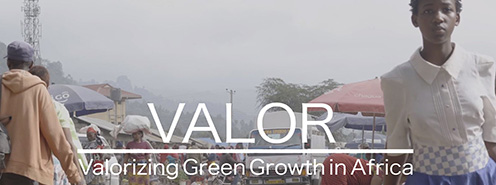VALOR – Valorizing Green Growth in Africa
Africa has untapped potential for creating monetary value from origin products in the same way ham from Parma and other highly valuable EU agricultural origin food products registered with ‘protected’ Geographical Indications (GIs) add 15 billion Euros per annum to European agriculture. Aiming to accelerate valorization of green inclusive growth in Africa, VALOR will create new knowledge on how African origin product (OP) producers can add value to their products by documenting and incorporating territory specific cultural, environmental and social qualities. In the Comprehensive Africa Agriculture Development Program (CAADP) context VALOR will thus promote wise use of market forces. VALOR involves research capacity strengthening in 3 partner countries, Ghana, Kenya & Tanzania, pursuing its objectives via 5 work packages (WPs). WP1 investigates institutional environments for valorization via OPs & GIs, WP2 collects & analyzes data on private sector practices with OPs and GIs, and WP3 provides an in-depth strategic case study of honey as a GI product embodying the smallholder stewarded ecosystem service pollination. WP4 provides crosscutting analysis & synthesize research findings for policy relevance, and WP5 coordinates the project, including the research capacity building activities through the WPs, 6 PhD students, 5 universities & knowledge dissemination. Project methodology ensures data collection and fieldwork, involving agencies in the public & private sector. Articles, conference papers, policy briefs, website & other VALOR outputs feed into an impact pathway including country roundtables & review mechanisms of the CAADP, helping Africa leapfrog into a green economy allowing geographical indications (GI´s) add billions of Euros to its monetary economy and allowing smallholders create employment and build monetary value, stewarding pollination services, and so increasing qualities and volumes of the wider food economy.
Time frame:
January 2014-December 2017
Source of financing:
Danida
Amount:
Total: DKK 10.0 mill
IFRO share: DKK 3.7 mill
- University of Copenhagen, Faculty of Science, Department of Food and Resource Economics
- University of Cape Coast, Ghana, Department of Entomology & Wildlife
- University of Ghana, Legon, Department of Geography and Resource Development
- University of Nairobi, Department of Agricultural Economics
- University of Dar es Salaam,
- Department of Economics
- Institute of Resource Assessment
- Danish Beekeepers Association
- ICRAF (Knowledge Partner)
2 reports were written by VALOR: 2014 and 12015. The reports can be obtained by contacting Aske Skovmand Bosselmann.
Article from VALOR
Characterization of Kenyan Honeys Based on Their Physicochemical Properties, Botanical and Geographical Origin
By Mary Wanjiru Warui , Lise Hansted, Mary Gikungu, John Mburu, Geoffrey Kironchi, and Aske Skovmand Bosselmann. In: International Journal of Food Science, Vol. 2019
Abstract
Properties and composition of honey are essential in providing information regarding their quality as well as in their differentiation based on production region characteristics, e.g., floral sources. This paper presents physicochemical properties and floral sources (botanical origin) of 21 honey samples obtained from arid and semiarid areas of Kenya, specifically, West Pokot, Baringo, and Kitui Counties. Physicochemical parameters which were analysed to determine honey quality included moisture content, hydroxymethylfurfural (HMF), diastase activity, free acidity, and electrical conductivity.Values of these parameters were compared with those of the existing local, regional, and international standards for honey. Melissopalynological analysis (pollen analysis) was also carried out to provide information on botanical origin of the honeys. Results showed mean parameter values of moisture, 16.34%; HMF, 23.28mg/kg; diastase activity, 10.67 Schade units; free acidity, 22.95meq/kg; and electrical conductivity, 0.40mS/cm. Free acidity and electrical conductivity values of honey samples obtained from West Pokot were significantly lower than the values of honeys from Baringo and Kitui. Eighteen (18) honey samples had all parameter values within the limits set in the East African, Codex Alimentarius, and the European Union directive standards for honey. Results also showed a total of 29 pollen types in the honey samples analysed, and Acacia spp. was the predominant pollen type in 4 of the 21 honey samples. Findings of this study showed that Kenyan origin honeys can tap into the existing regional and international markets based on their quality which can be attributed to their botanical origin. Results of this study also suggested that honey producers have undertaken appropriate measures in honey harvesting, processing, handling, and storage. However, there is a need to build capacity of producers whose honey were of unacceptable quality. This would involve training on proper honey production, processing, and handling practices as well establishment of honey collection and processing centres at the local level in order to improve honey quality. This will enhance access to existing honey markets. Conservation of bee floral sources would also be needed to maintain honey quality.
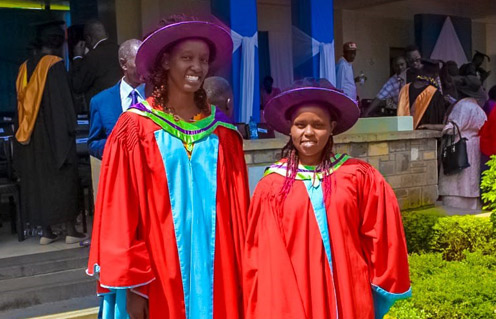
Dr. Mary Warui and Dr. Fredah Maina
On 21 December 2018, VALOR PhD students Mary Warui and Fredah Maina (University of Nairobi, Kenya) successfully defended their phd theses based on the VALOR project.
Alphafilm have produced a small movie about the core concept in VALOR.
Article from VALOR
Producers’ Perception of Geographical Indications as a Product Diversification Tool for Agrifood Products in Semi-Arid Regions of Kenya
By Fredah Wangui Maina, Chris Ackello-Ogutu, John Mburu and Henrik Egelyng- In: International Journal of Food and Agricultural Economics, Vol. 6, No. 2, 2018, p. 85-100.
Abstract
The study assessed producers’ awareness and perceptions of territorial-based qualities and the economic potential of two potential origin-based geographical indications in two semi-arid counties in Kenya. Protection of the origin products as geographical indications is presented as an option for ecosystem approach in managing fragile semi-arid regions while providing producers economic incentives and social inclusion; key components of green growth. Factor analysis was conducted on Likert scale perception questions administered to producers of goats (Baringo) and mangoes (Makueni). The producers were aware of the uniqueness of their products and its geographical source. The resultant factors reveal the importance of public policies, institutions, market access and public sector actors as important to producers’ perception of the success of protecting their products as geographical indications. Clustering revealed producer heterogeneity in their perceptions of protecting their respective products as geographical indications. The constitution of the clusters was significantly different based on the number of years the producers had practiced farming in the region, their awareness of the uniqueness of their goats, income received from goat production and institutional factors. Enhanced collective action for both goats and mangoes in the semi-arid regions would ensure collective reputation in the product presented to the market. The producers’ perceptions emphasise geographical indications as a marketing tool rather than an environmental tool, agreeing with Principle 4 of the ecosystem approach on managing ecosystem in an economic context.
1st VALOR Project PhD
On November 6 2017, VALOR PhD student Ms. Innocencia John successfully defended her PhD thesis at the University of Dar es Salaam (UDSM), and – at the graduation ceremony November 18 – became the first of the six VALOR PhD students to graduate with a PhD degree. Dr. Innocensia John has now taken up a position with the Tanzania Office of the International Institute of Tropical Agriculture (IITA).

2nd VALOR PhD thesis submission
On Friday, December 8 2017, VALOR PhD student Mr. Courage Besah-adanu submitted his PhD dissertation for the consideration of the University of Ghana, Cape Coast. Mr. Besah-adanu is yet to receive a date for the defence. Besah-adanu is now working as a consultant to the Swiss GI project in Ghana.
VALOR Writeshop Arusha 2017
VALOR held its second 2017 writeshop from Monday December 27 to Friday December 1 at the MSTCDC Training Centre, Arusha, Tanzania. The six PhD students from Ghana, Kenya and Tanzania worked intensively for five days in a row with their University of Copenhagen co-supervisors and three reviewers from the World Agroforestry Centre to further develop two manuscripts with a view to submission to international and peer reviewed journals. See more about University of Ghana, University of Cape Coast, University of Nairobi and University of Dar es Salaam.
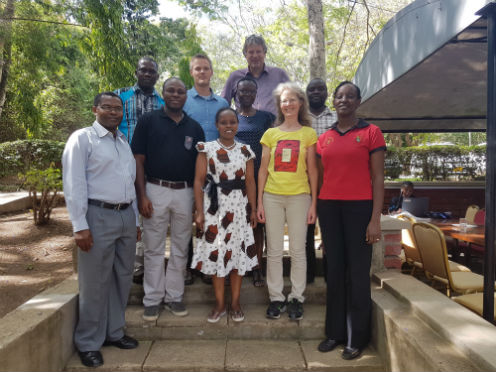
VALOR Dissemination Workshop 2017
The VALOR Dissemination Workshop was held Monday December 4 to Wednesday December 6 at the MSTCDC Training Centre, Arusha, Tanzania. VALOR partners from University of Copenhagen and the World Agroforestry Center and invited speakers discussed options for outscaling and upscaling VALOR findings and lessons learned of relevance for the sustainability of VALOR results beyond the project period. See more about the World Agroforestry Centre (ICRAF) and MSTCDC.
Aloe Vera from the Kilimanjaro Region
Aloe Vera from the Kilimanjaro region is one of the Tanzanian origin products identified by the VALOR project as having potential for registration with a geographical indication. The rich fertile volcanic soils of the plains below Kilimanjaro Mountain, is one of the factors defining Aloe product qualities, according to a local producer.
Ghana Savannah Yam
Yam cultivated in the Ghana Savannah region is one of the Ghanaian origin products identified by the VALOR project as having potential for registration with a geographical indication. A thousand year old cultural tradition for yam cultivation is one of the defining characteristics of the quality and reputation of Ghana Savannah yam.
Ghana GI Stakeholder Workshop
A stakeholder workshop on Ghanaian GI was held on November 23 2017, at the University of Ghana, Legon. A total of 70 participants of diverse backgrounds were in attendance. These participants include 33 producers of pona yam, shea butter, cocoa and honey. There were representatives from parliament, academia, experts on GI, state agencies specifically the Ministry of Food & Agriculture, Registrar General’s Department, Food Research Institute and Ministry of Trade. We also had participants from NGOs, exporters, the chef and owner of Midunu restaurant Selassie Atadika, Peasant farmes association of Ghana and six media houses in attendance.
Policy briefs
The first in a series of VALOR project policy briefs was published in connection with the Ghana GI Stakeholder Workshop on November 23 (see above).
Danish beekeepers are learning about VALOR
A new article about VALOR is now published in the Danish Bee Journal. The journal is for the members of The Danish Beekeepers Association (Danmarks Biavlerforening). The aim of the article is not only to inform the Danish beekeepers of VALOR but also to lay ground for possible future collaborations between Danish and African beekeepers.
The article is called 'When honey tastes like geography' (Når honning smager af geografi' PDF).
African Quality Honey (almost) ready for GI registration
It is almost there; the recognition of quality origin honey from distinct areas across Tanzania, Kenya and Ghana. The quality is high, the demand is high, and producers are well-aware of the link between the local flora and environment and the quality of their honey. But something is missing, as found by local PhD students working in the VALOR project.

a: Top-bar and traditional log hives in endemic Itigi thickets (Tanzania); b and c: combs from log hives and top-bar hives inspected for honey (Tanzania and Ghana); d: Organic honey from West Pokot, Kenya.
In the arid lands of West Pokot in Kenya, former nomadic herders have come together in a self-help group called Cabesi, supported by the Swiss BioVision Foundation, and started joint production of honey. As indicated by pollen sensory analyses, the quality of the honey is linked to the natural forests of indigenous trees and shrubs where bees collect nectar and pollen, and to the traditional knowledge of honey production, making it a good example of an origin product. Similarly, unique honey is produced in areas of Tanzania and Ghana, where the local flora and local beekeeping practices result in products of high quality. However, in all three countries the recognition of and value addition from the origin-based quality is hindered by the lack of a legal and institutional framework for origin product registration, as well as limited support to beekeeping groups and their collective actions toward a consistent quality production and geographical branding. In these latter aspects, the Cabesi group in Kenya is one of the fortunate few that have benefitted and now showcase the support they have received. VALOR researchers are investigating the main barriers for GI honeys and are disseminating their findings to relevant actors through stakeholder workshops, thereby catalyzing interest in and focus on origin honey products in the three African countries.
Origin products from African forests: a Kenyan pathway to prosperity and green inclusive growth?
(E-pub ahead of print) Many tropical countries have potential for adding market value to unique forest origin products similarly to how EU gain billions of Euro's annually from registering agricultural origin products, with Protected Denomination of Origin or Protected Geographical Indication. Following analysis of the renaissance for the global Geographical Indication (GI) regime, this article provides case-studies from Kenya – on Mwingi Honey, Kakamega Silk and institutional conditions under which producers may incorporate territory specific cultural, environmental, and social qualities of their unique products. We investigate prospects for Kenyan producers to create and capture additional monetary value for their forest related origin products, allowing smallholders to build livelihood, while stewarding natural environments.
First international peer-reviewed article from VALOR:
Tanzanian food origins and protected geographical indications
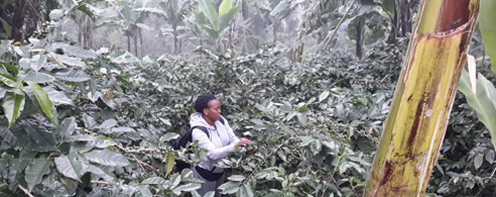
Coffee plantation Kilimanjaro
As the world's population is constantly growing, food security will remain on the policy Agenda, particularly in Africa. At the same time, global food systems experience a new wave focusing on local foods and food sovereignty featuring high quality food products of verifiable geographical origin. This article argues that Geographical Indications (GI´s) hold the potential to help transform the Tanzanian agriculture-dependent economy through the tapping of value from unique products, attributing taste and colour to place or regional geography. This study aims to identify the existence and characteristics of food origin products in Tanzania that have potential for GI certification.
Go to 'Tanzanian food origins and protected geographical indications'
Case studies on Kenyan Origin products with potential for being labelled with geographical indications
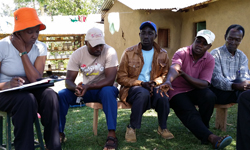 Fredah Maina study products of Kenyan origin with potential to be formally registered with geographical indications (GI). The studies are based on literature review, focus group discussions, in-depth and key informant interviews, as well as household interviews using semi-structured questionnaires. For a product to be successfully registered and marketed, the producers need to define its specificity, as preferred by the consumers as well as the uniqueness in the production region. Fredah's study further documents producer perceptions (supply end) concerning the
Fredah Maina study products of Kenyan origin with potential to be formally registered with geographical indications (GI). The studies are based on literature review, focus group discussions, in-depth and key informant interviews, as well as household interviews using semi-structured questionnaires. For a product to be successfully registered and marketed, the producers need to define its specificity, as preferred by the consumers as well as the uniqueness in the production region. Fredah's study further documents producer perceptions (supply end) concerning the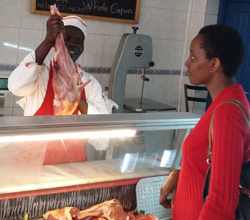 quality of their products, as well as their willingness to register the products considering the current institutional and policy frameworks. From an initial scoping study, five products were identified to have GI potential:(i) Coffee from Muranga County (ii) Tea from Kirinyaga County (both in central Kenya); (iii) Mangoes from Makueni County in Eastern Kenya; (iv) Meat Goat from Baringo County in North Rift region; and (v) Tilapia fish from Lake Victoria. The study also analyses the policy and institutional frameworks in existence that would affect or influence protection of the different products once registered with geographical indications.
quality of their products, as well as their willingness to register the products considering the current institutional and policy frameworks. From an initial scoping study, five products were identified to have GI potential:(i) Coffee from Muranga County (ii) Tea from Kirinyaga County (both in central Kenya); (iii) Mangoes from Makueni County in Eastern Kenya; (iv) Meat Goat from Baringo County in North Rift region; and (v) Tilapia fish from Lake Victoria. The study also analyses the policy and institutional frameworks in existence that would affect or influence protection of the different products once registered with geographical indications.

Power of Origin in Tanzania
Innocensia John, a PhD student funded through the VALOR project, has interviewed producers and sellers/retailers regarding potential Geographically Indication (GI) on products in Tanzania. Five products with prospects for Tanzania to leapfrog into exports and promotion of origin or potential GI products were investigated: coffee, sugar and aloe vera from Kilimanjaro, rice from Kyela district in Mbeya region and cloves from Zanzibar (Unguja and Pemba). The products (see pictures below) were researched for unique attributes linked to their ´territory of origin´ and incorporation of ´taste of place´. The unique qualities of these products may generate or capture market value and create incentives for producer alliances to act as stewards of the cultural and natural landscapes on which the products are made. The harvesting of GI opportunities of unique products through a national GI framework represents an important export opportunity for Tanzania.
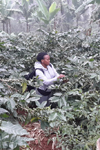
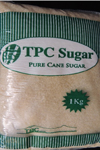

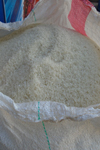
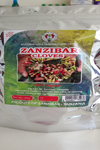
Embodying pollination services into GI labelling for Ghanaian honeys
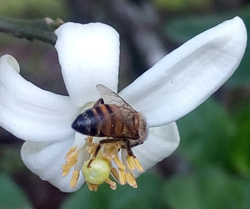 Courage Besah-Adanu is under way with a fieldwork experiment involving marking of bees and observation of foraging activities of marked bees within selected cash crops (orange/mango) in the study sites where potential GI honeys are produced. The first experiment was done in April. Preliminary results show that marked bees were observed entering the hives with pollen while unmarked bees were observed foraging on orange flowers in the orchard. The experiment will be repeated in other cash crop farms. This time more bees will be marked to increase the rate of observing and capturing marked bees foraging on flowers with cameras. This is expected to show that
Courage Besah-Adanu is under way with a fieldwork experiment involving marking of bees and observation of foraging activities of marked bees within selected cash crops (orange/mango) in the study sites where potential GI honeys are produced. The first experiment was done in April. Preliminary results show that marked bees were observed entering the hives with pollen while unmarked bees were observed foraging on orange flowers in the orchard. The experiment will be repeated in other cash crop farms. This time more bees will be marked to increase the rate of observing and capturing marked bees foraging on flowers with cameras. This is expected to show that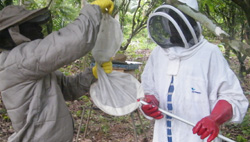 honeybees within the study areas are pollinating cash crops which is necessary for high fruit yield and quality. That can be translated into high quality food for consumers and more income for producers hence buttressing the argument for a possible premium for quality honeys which can lead to proper conservation ethics for bees.
honeybees within the study areas are pollinating cash crops which is necessary for high fruit yield and quality. That can be translated into high quality food for consumers and more income for producers hence buttressing the argument for a possible premium for quality honeys which can lead to proper conservation ethics for bees.
Kenyan honey with potential for Geographical Indications
Through interviews with Kenyan honey producers, traders, consumers as well as some state authorities one of the Kenyan VALOR project PhD students, Mary Warui, has pursued a research question on whether and how Kenyan regions may have potential for producing GI honey. Preliminary results indicates that honeys from Baringo, West Pokot and Mwingi, Kitui, all Kenyan regions, have unique taste and viscosity that can be differentiated from honeys produced in other regions. The qualities of these honeys are attributed to the vegetation (floral sources) present in those areas as well as the honey harvesting, handling and processing methods used by the communities in the region where production takes place. Characteristics of these honeys can enhance their GI labelling if the conditioning factors for labelling products as GI are in place and implemented. The study is ongoing and in preparation for publication.
VALOR at FLARE Conference in Paris
Aske Bosselmann gave a ´lightning talk´, based on a paper by VALOR authors, to the First Annual Forests & Livelihoods: Assessment, Research, and Engagement (FLARE) Network Conference, held at Musée de l’Homme in Paris, November 2015. The paper was subsequently submitted to an international peer reviewed journal.
Sensory test of African honeys: preliminary results
The data from the sensory test done 4 November 2015 have been analyzed. Preliminary results shows specific differences between honeys and between countries, which is interesting. The testing was done with a fast inexpensive but effective method - which can easily be replicated by the researchers in the participating countries. Apart from being of value for the VALOR project, the procedure could become a valuable tool in selection of honeys and in development of the honey industry in Africa.
VALOR stakeholder workshop in Tanzania February 2016
Representatives from Tanzanian producer organizations, public agencies, universities and ICRAF participated 2 February 2016 in a one day workshop on Tanzanian origin products and Geographical indications (GI), held north of Dar Es Salaam. The workshop featured presentations on how to utilize and develop GI products in the Tanzanian context and lead to the development of a Tanzanian action plan for GI´s facilitated by ICRAF (Dr. Amos Gyau) and the University of Dar es Salaam (Prof. Agnes Mwakaje).
VALOR sensory test of African honeys in collaboration with Nordic Food Lab
November 4th 2015 68 persons took part in a sensory analysis using a CATA test of Kenyan, Tanzanian and Ghanaian honeys at the University of Copenhagen. The purpose was to obtain a greater knowledge of the quality of the honeys, and to describe their taste. This information added to chemical/physical analyses and information on beekeeping methods and bee hive surroundings will help the VALOR researchers to select and describe unique honeys qualifying for GI protection.

